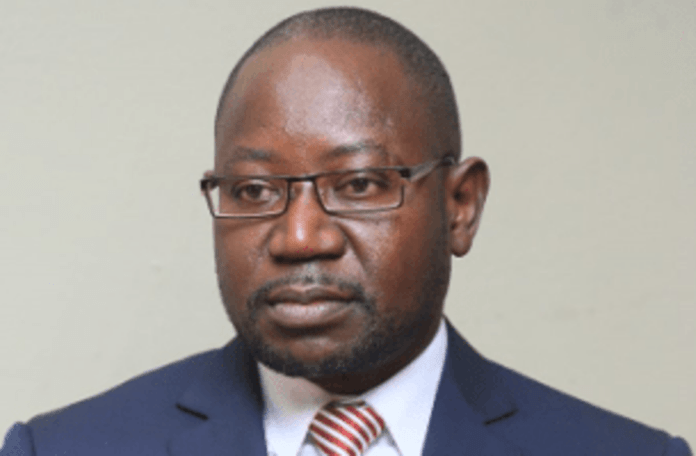By Yankuba Jallow
Lawyer Mai Ahmed Fatty, the leader of the Gambia Moral Congress (GMC) said Thursday, 24th September, the 1997 Constitution does not have a provision for its repeal.
He said the Minister of Justice relied on the wrong provision of the Constitution they knew would automatically lead to the rejection of the Bill seeking to repeal the 1997 Constitution. He said the Government contributed in the ‘killing’ of Bill seeking to repeal the 1997 Constitution by relying on the wrong provision of the law.
“Section 226 does not repeal the 1997 Constitution and it does not provide a possibility of the replacement of the 1997 Constitution. In fact the 1997 Constitution does not envisage a change. It does not envisage its repeal or the repeal of the entire provisions of the 1997 Constitution,” Fatty said.
Asked to state the provision of the 1997 Constitution which is proper to introduce a new constitution, honourable Fatty maintained that there is no provision in the entire 1997 Constitution providing for repeal of the whole Constitution. He said he is not the legal adviser to the President adding it is the Attorney General and Minister of Justice who should answer that question.
“I am not saying it is impossible to repeal it [1997 Constitution] because we are attempting to repeal, but I am saying the way the 1997 Constitution has been drafted was not envisaged to be repealed. I know constitutions can be repealed but what I am saying is the Constitution itself does not envisage for it to be repealed,” Fatty said.
He added: “there is no law in the [1997] Constitution that provides for its repealing. We would go further to assert that there is no provision in the entire 1997 Constitution dealing with the promulgation of new constitution.”
He said there exists Act of the National Assembly [Constitution Referendum Act which is Act number 33 of 1965] dealing with constitutional referendum, but was quick to add that it deals mainly on the role of the Independent Electoral Commission.
Mai Fatty said the role of the Attorney General’s Chambers and Ministry of Justice is most shocking.
“We hold the Government directly responsible for the rejection of the so-called Bill. We conclude that there was no sincerity on the part of the Government with regards to the entire reform programme,” he said.
“This is the surest evidence of the government defeating its own bill in parliament. They presented the bill pursuant to section 226 of the Constitution – a provision that has absolutely nothing to do with presenting a draft constitution promulgation bill before the National Assembly. It is not the section for referendum on a new constitution,” Fatty said.
Lawyer Fatty maintained that the 1997 Constitution envisages different types of referenda such as section 63 (5) and 226 (7) pertaining to entrenched provisions of the constitution.
“We are saying the entire provisions in section 226 of the Constitution are not relevant for the purpose of a constitutional promulgation. It is a wrong provision in law,” Fatty said.
He added: “the Minister of Justice intentionally chose the wrong provision of the law that will ensure the failure of the Bill in parliament.”
He said the heading of section 226 is “Alteration of this Constitution”.
“Certainly, section 226 is not talking about a draft constitution. It concerns the alteration of the provisions of the 1997 Constitution. The word “alteration” is not technical. Its ordinary meaning applies, meaning changing any of the provisions of the 1997 Constitution and not the promulgation of a draft constitution, or worst still, the repeal of the same,” Fatty said.
Fatty said the manner in which the Bill was drafted, and relying on the wrong provision of the law to initiate a parliamentary process, facilitated the rejection of the Bill.
“Alteration does not mean cancellation [repeal]. Nobody cancels anything you alter. You only change the format – either you add something or you remove something but the thing remains,” Fatty said.
He added: “Introducing a new Bill is different from alteration of the Constitution. All the provisions in section 226 are dealing with the alteration of the constitution and not the repeal of the constitution. Certainly, section 226 is not talking about a draft constitution. The word ‘draft constitution’ does not exist anywhere in the entire [1997] Constitution. The word “promulgation of a new constitution” does not exist anywhere in the entire [1997] Constitution. The word “repeal of this constitution” does not exist.”
Honourable Fatty said the culprit responsible for the rejection of the Bill is the Government of The Gambia.
“The lacklustre attitude and demeanour of the Attorney General, evidenced through his conspicuous indifference on the floor of the Assembly is in itself conclusive of Executive complicity in defeating its own Bill,” Fatty said.
On the 22nd September 2020, the Gambia National Assembly rejected the 2020 Draft Constitution at the second reading after failing to meet the threshold of votes for its advancement to the third reading.
“The CRC is by far the most significant policy failure of the current administration [government]. Ironically, its monumental failure was directly orchestrated through a wheel conspiracy by known politicians in the Executive and Parliament [National Assembly]. While the few proxies completed the ‘dirty job’ on the floor of the Assembly chamber, the invisible hand of the main protagonist became visible through the uniformity of their feeble arguments,” he said.
He said the lawmakers that voted against the Bill limited their reservations on three issues which were term limit, substantial reduction of Executive powers and remuneration package to the judiciary.
“None of their objections are [were] grounded either in law, logic or national interest,” Fatty said.
Fatty said this day will go down in the history of The Gambia as a day of “The Great Betrayal”. He said this was day when a group of politicians acting as known proxies for and on behalf of an ill-guided leadership attempted to kill the collective national aspiration of the people for a fresh start.
He said the Gambians voted for the Coalition of opposition parties in December 2016 in exchange of a promise to bring a ‘system change.’ He said the people voted against Yahya Jammeh and the APRC in an attempt to end perpetuation of the consolidation of the status quo at the time. Fatty said the electorates voted for ‘system change’ adding the Coalition manifesto was a framework that embraced three values: reform programmes, strengthening of government institutions and enthronement of the principles of inclusive democracy. He argued that constitutional review among others was the central ‘nervous system’ reform agenda.
He said the Security Sector Reform is anything but a success and the civil service reform has not even been placed on the menu yet. He said there was lack of transparency in the implementation of the ‘Janneh’ Commission recommendations.



















